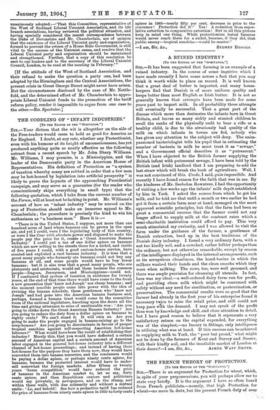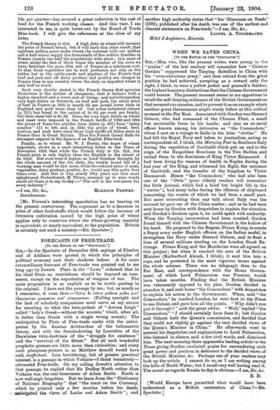THE FRENCH THEORY OF PROTECTION. me ma EDITOR OF THE
"SPECTATOR.1 Snt,—There is an argument for Protection for wheat, which, in spite of your prepossessions, you will perhaps allow me to state very briefly. It is the argument I have so often heard from French publicists,—namely, that high Protection for wheat—no mere 2s. duty, but the present French duty of over 12e. per quarter—has secured a great reduction in the cost of food for the French working classes. And this view, I am interested to see, is quite borne out by the Board of Trade Blue-book. I will give the references at the close of my letter.
The French theory is this. A high duty on wheat will increase the price of French bread ; but it will have this other result, that eighteen million acres under wheat (by contrast with our million and a half acres) supply the farmsteads of five million families in France (nearly one half the population) with straw ; this mass of straw, under the feet of three times the number of the cows we have, fertilises the poor, thin soil of France at a minimum cost. So that fresh vegetables are in such profusion, not only on the tables, but in the cattle-yards and pigsties, of the French that ,beef and pork and all dairy produce and poultry are cheaper in France than in any country where the duty on imported wheat is only half as much.
Such very shortly stated is the French theory that agrarian Protection is the mother of cheapness ; that it induces both a higher standard and a lower cost of living ; and notwithstanding very high duties on livestock, on beef and pork, the retail price of.beef in France (p. 222) is nearly 3d. per pound lower than in England, and pork more than id. Our urban industrial classes (p. 211) buy bread to the extent of 3s. 6d. per week per family, but their meat bill is 6s. 3d. Since the very high duties on wheat and meat were imposed in the French tariffs of '1892 and 1894 the prices of these two articles have fallen (p. 227) from "index number" 111 to 100, and (p. 234) the prices of wheat, beef, mutton, and pork have since those high tariffs all fallen more in France than in Great Britain. Thus the French theory finds its strongest support in the figures of an English Blue-book.
Finally, as to wheat. Mr. W. J. Harris, the doyen of wheat importers, shows in a most interesting letter to the Times of November 12th that while the French duty is 12s. 24d., the French price is only higher than the English to the extent of 6s. 10141. But even were it higher, as Lord Gosehen thought, by the whole amount of the 12s. duty, the weekly bread bill of a working man would be 24d. more, while the reduced price of meat, vegetables, dairy produce, poultry, &c., would pay this quite four times over. And this is why nearly fifty years ago that most enlightened Protectionist, M. Thiers, summed up in nine words about all there is to say to-day :—" The soil is the wet-nurse for every industry."
—I am, Sir, &c., MORETON FREWEN.
[Mr. Frewen's interesting speculation has no bearing on the present controversy. The argument as to a decrease in price of other food-stuffs which would follow the increase of intensive cultivation caused by the high price of wheat applies only to countries where the wheat-growing capacity is equivalent, or nearly equivalent, to the population. Britain is certainly not such a country.—ED. Spectator.]
FORECASTS OF FREE-TRADE.











































 Previous page
Previous page